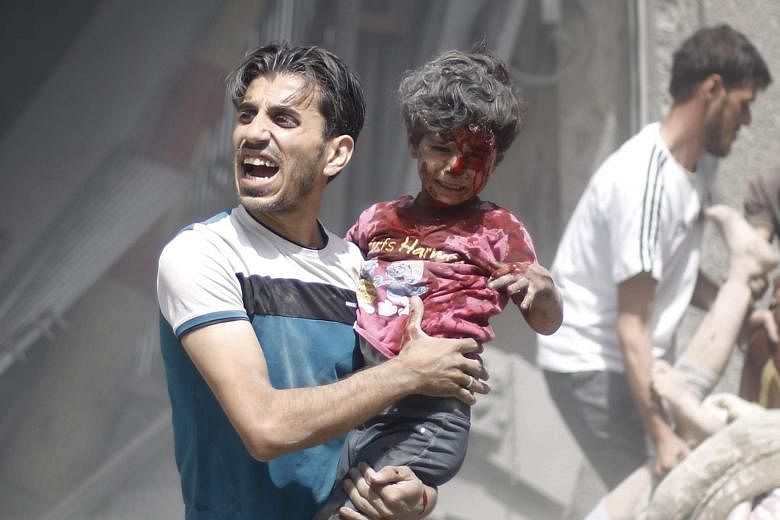SOFIA • Archaeological sites in Syria are being looted "on an industrial scale" and the proceeds are funding extremists from the Islamic State In Iraq and Syria (ISIS), the head of Unesco has warned .
"Satellite imagery shows that archaeological sites in Syria are dotted by thousands of illegal excavations... that show there is looting on an industrial scale," Ms Irina Bokova told a conference in Sofia, Bulgaria, yesterday.
"Limiting the trafficking in cultural property is a top priority because it finances the actions of the extremists. The world expects from us to undertake decisive and uncompromising actions... to stop this source of funding for the extremists."
In four years of civil war, and with ISIS controlling large swathes of the country, the Association for the Protection of Syrian Archaeology says more than 900 monuments and archeological sites have been looted, damaged or destroyed.
The militants have blown up several tower tombs at the Unesco-listed world heritage site of Palmyra, which they captured in May. Ms Bokova said Palmyra's destruction "is an impudent crime against civilisation because it was a symbol of cultural dialogue... This is what the extremists are seeking to destroy".
She urged the European Union to strengthen its legislation in relation to the import of cultural property, adding to a panoply of tough EU measures. Ms Bokova also stressed the need for a global campaign "to counter the propaganda for cultural cleansing" waged by ISIS.
As global focus has shifted to ISIS' violence and the threat it poses beyond Syria, less attention has been paid to the original struggle between Syrian President Bashar al-Assad and insurgent groups. That earlier conflict was driving people from their homes long before ISIS existed in its current form.
Advocacy groups for the Syrian opposition, as well as international watchdogs like Human Rights Watch, have long contended that the security forces' bombardment of insurgent-held areas like Douma takes the largest toll on civilians, killing far more people than ISIS.
Every morning at the dawn call to prayer, women and children move silently from Douma, a suburb east of Damascus, to the surrounding farm fields, seeking safety from the day's bombardments by the government. The walk is part of a surreal routine described by the fraction of the residents who stay: shopping on half-demolished streets, scavenging wild greens, carrying out mass burials. Not even the fields are safe; recently, bombs killed 10 people in two families there, including seven children.
As Syrians transfix the world with their flight to Europe, they leave behind empty neighbourhoods that testify to the scale of their exodus.
Such bombardments have been going on for years in insurgent-held areas like Douma. And yet, the situation can still get worse. The past month in Douma made that clear.
Government forces began a barrage even more intense than usual, using not only the artillery shells that Douma has come to expect, but also air strikes. Perhaps four out of five residents had already fled what was once a bustling community of around half a million, and emergency workers say the new bombings drove out thousands more.
More than 550 people, mostly civilians, have died in the past month in Douma and nearby suburbs, 123 of them children, Red Crescent medics say. Although no definitive numbers exist, a tally by a civilian opposition group said 18,000 had been killed by air strikes, which only the government has the ability to carry out, and that more than 27,000 had died in shelling and rocket attacks by all sides. The Syrian government says it is bombing terrorists.
On Aug 16, at least 122 died in one of the war's deadliest air attacks, say rescue officials and monitoring groups. The new attacks have gutted Douma's meagre remaining street life and local institutions.
Douma's free fall has prompted doctor Adnan Tobaji and several hundred colleagues and residents to sign a petition calling for a complete humanitarian truce. It sets no preconditions for the fate of Mr Assad.
"The fate of Assad for us is nothing compared with the fate of Syria the country, the people and the children," Dr Tobaji said. "At this moment while we are talking, a Syrian is being killed. We need a solution by any means to stop the fighting." AGENCE FRANCE-PRESSE, NEW YORK TIMES

